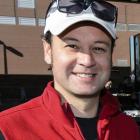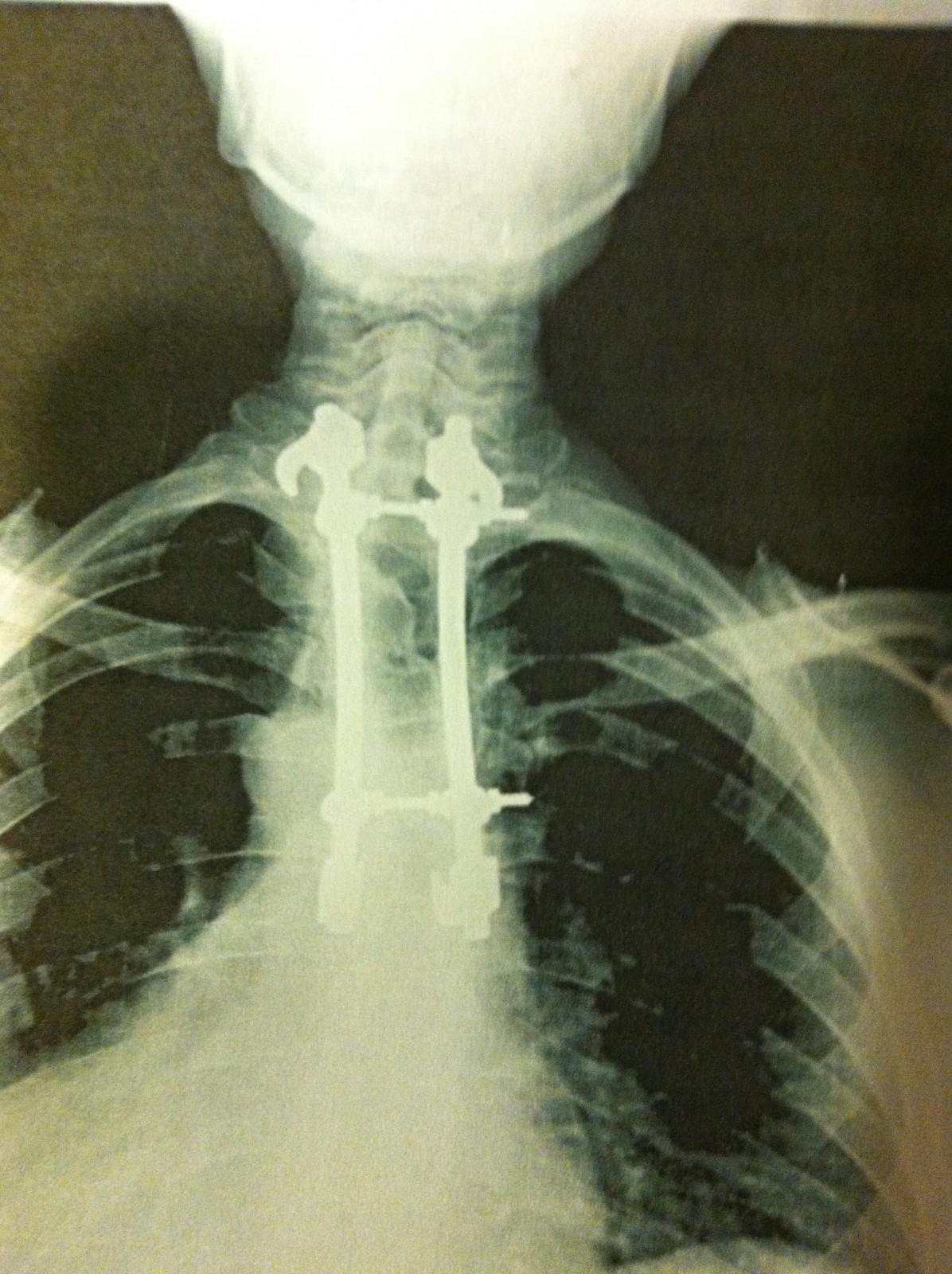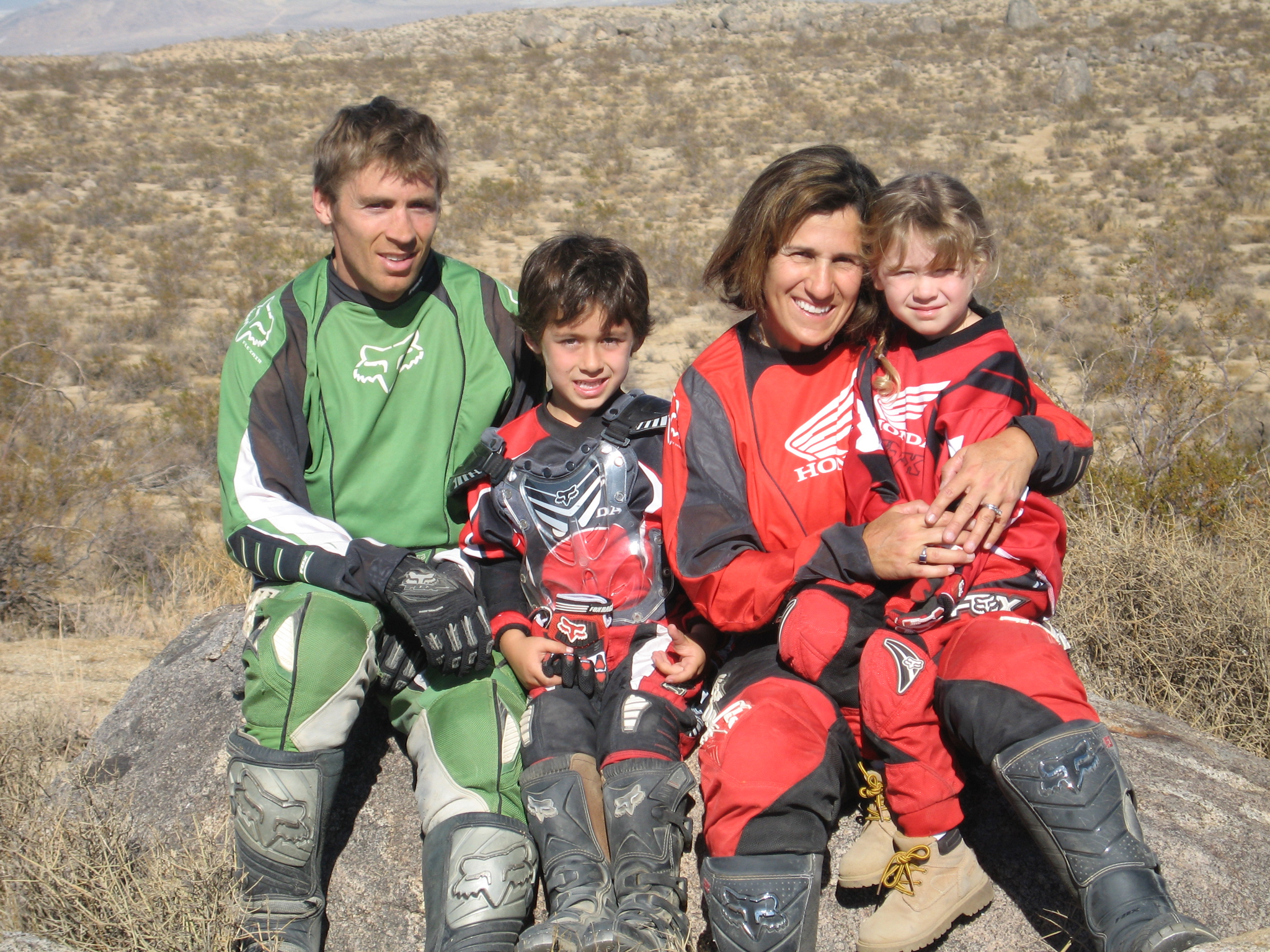Derek Natvig grew up racing motocross in Southern California with his family. By 1987, he was fast enough to load up the family RV and started racing competitively in the amateur nationals. Natvig was fast—he won the very competitive 125 B class at Loretta’s in 1989—and was well on his way to a successful career as a professional racer. But in 1991, shortly after turning pro, Natvig crashed and broke his back. He was paralyzed from the chest down—and unsure if he would ever walk again.
Natvig fought back, and slowly his damaged spinal cord healed. After six months, he re-learned how to walk again, and within a year was back on a bike. By 1994 he was fully healed, and would race to a seventh place in the 125cc class at the San Jose Supercross (he also qualified for several other supercross main events as well as the Hangtown National).
Today, Natvig has a job that most former motocross racers can only dream about: he works for Kawasaki Motors Corp., USA and carries the title of senior race marketing specialist. We caught up to him recently to see what life is like after racing, while still being involved in racing.
Racer X: Thanks for speaking with us. How did you land this sweet gig at Kawasaki?
Derek Natvig: Thanks for being patient with getting this set up. Today got really busy because we’re feeling good that we are going to win some races, so we’ve been in a lot of meetings planning for what to do when that happens. As for me, I guess I should start back from the beginning. When I first started in motocross, I was racing for Team Green back in the day. This was 1988 or so. Maybe my biggest claim to fame as a racer was wining Loretta Lynn’s in the 125B class back in ’89, and as a Team Green rider. Since I was a local SoCal guy, Kawasaki asked me to do some test riding for them as well. So I did several years of that. It’s the same deal a lot of guys have done—we did both endurance testing and product development. That got my foot in the door, and then they made me an offer for a full-time job in house, so I took it. That was 1994 or so, and I started to work my way up.
You were a promising amateur rider, and you ran with a circle of really fast guys back then. What do you think kept you from taking that next step at the top level?
That’s an easy one. Shortly after I turned pro, I was racing a Trans Cal Winter Series event at Sunrise [Cycle Park—now renamed Racetown 395]. I crashed on this one jump and broke my back pretty bad. I was knocked out and someone landed on top of me. Crushed six vertebrae. That was right at the same time Mitch [Payton] was starting his team and I was friends with him and riding with all those guys. But I was suddenly paralyzed.
Whoa—that’s scary! Where was your injury on your body?
I couldn’t move from my chest down. But I was lucky my paralysis was temporary. It turned out my spinal cord wasn’t damaged, it was just shocked. Your nervous system is like a tree or plant, if you break the roots or a branch, sometimes they grow back, sometimes they don’t. No two injuries are the same. For me, I was fortunate enough where once they relieved the swelling, the nerves slowly came back. I was off for at least a year. That happened in January 1991. In 1992 I came back to racing. By 1994 I raced a few 125 supercross events and one outdoor national. I think I finished 15th or so at that one national. But I didn’t walk for six months after it first happened.
So after that injury, you came back and raced? That takes some serious courage.
Well, right after my crash, I had no interest in riding again. But I still had the bikes and the gear, so after a while, I just went out there and had fun and rode around with some friends. You know, for me, it’s funny how quickly I forgot about the injuries and could only remember what it was like to win and be on top. I guess it’s like arguing with your spouse or whatever, you remember the good and tend to put the bad out of your head. Plus I was young, which helped as well. But looking back at it now, for sure I still had the bug to race, but lost the edge. No question in my head that I had a hard time getting back to where I was before I crashed, but I kept trying.
I would think mentally it must have been a huge challenge to get back behind the gate.
Well, coming up as a kid, I was just on a upswing and a roll. There wasn’t much you couldn’t tell me I couldn’t do. After that crash, I went through some really hard struggles, and the wins and the accomplishments were fewer and farther between. I found that both winning and progressing to a higher level wasn’t as fruitful as it was before. Going into the first turn with a full pack, I was worried about getting landed on. Before my crash, I didn’t have a doubt I would make it to the top, but then after that crash, I stated to wonder.
How did you decide to hang it up?
Well, it wasn’t hard. There weren’t a ton of rides back then. Jeremy [McGrath] was a great friend of mine, we grew up together and were close. I knew how good he was, as well as some of the other guys I was riding with. I just wasn’t sure I could get as good or even close to those guys. Also, I’m really short, and this was before RC [Ricky Carmichael] came along, and I felt that my height might be an issue as well. In fact, I used to really look up to Wardy [Jeff Ward] since he was another short guy who made it. But then I got the offer from Kawi in 1994 to become a full-time employee and not a contract test rider, so I just took it, and that was it.
You’ve been with Kawasaki for 22 years. That’s a long time.
I say I went to Kawasaki College. I actually set aside my college education to follow my racing dream, then I got that full-time offer for R&D, and I put off college again. But I did the R&D thing for seven years, then moved into doing market research, and then moved over to marketing, where I am today. As for marketing, I have served in many different roles, but what I do now is race marketing. It’s kind of like a dream come true I guess, as it matches the company needs with my passion, and I have both of the backgrounds that are required for success.
The motorcycle business has changed a ton since 2000, and especially with the decline in unit sales related to the economy in 2008 through 2012. How did you guys weather that storm?
We’ve seen a lot of changes for sure. We used to have more passionate people who were long tenured employees, but now it is much more focused on skill sets, product background, and return on investment. Today’s world is entirely different than from the place I came from. I honestly think that today it would be hard for a guy like me to replicate my career path if I were to start all over.
Just the other day, I was speaking with a friend while I was on the way to a photo shoot. He said I was living the dream. I didn’t get it at first, my dream was always to be a factory racer, but I did get to some level of success in that area. But now I work with them professionally, and can continue to be around the sport that I love. So that is indeed a dream.
I understand that you and your wife are both Loretta’s champions?
Yeah, I guess so. I got together with and married Mercedes Gonzalez. It was funny, when we first got married, everyone made fun of us for being the fastest married couple, but then Andrew Short and Jackie came along. But yeah, we are a real motocross family now. She works over at Honda running their rider education center, but she won most of her Women’s Championships while riding for Kawasaki Team Green. We got married in 1998 and we have two kids, our son Cameron is 15 and our daughter is Danielle is 13. Neither of them really race, but they both ride just for fun. They are both really into mountain biking and soccer. They’re now getting into mountain bike racing in school, so that’s pretty cool. Also, we live in Orange County just up the road from Oakley and Kawasaki, so it’s like a short three-mile commute for me to get into the office.
Can you give me some specifics on your job with Kawasaki?
For the most part, I oversee all of our United States race marketing efforts, which focuses mostly on supercross and motocross. When the economy went bad in 2008 we sadly had to close our road racing program. So when it comes to that stuff, I also leverage other Kawasaki teams around the globe, including say, the World Superbike Series and some flat track stuff. So every week I work with agency people to organize the race win ad, social media, content, and get the message out there. And now, we really have a focus on leveraging race wins to use as a tool to sell our products. That is a direct result of having smaller budgets than what existed back in say, 2006. One other thing that I have been doing is working direct with Feld to create the Science of Supercross series. Those are the educational pieces that they play on the supercross TV shows, and they’re designed to help the novice viewers understand more about what is going on with what they are watching. Last year we did eight episodes, but this year we have 16 in total. We’re starting out at A1 with the heart rate monitors. But overall, I’ve been in this role for about a year and I feel like we are just getting started.
So you are basically “embedded” in the factory race team. How are things coming along with preparation for Anaheim?
Well, it’s really exciting. I think it’s no secret that Eli [Tomac] had some struggles last year. But they found a few things in the off-season, a few changes that made a big difference, and he certainly ended the off-season with a strong note with all those wins. So now he is pumped up and feeling better, and carrying that momentum into the off-season. Combine that with the things they found and hopefully that all translates to some big success on the race track. Time will tell, though.
You raced a ton at Loretta’s between 1988 and 1994. You won a championship, and earned three podiums as well as several other top-five finishes. Why were you so good at the ranch?
Man, it went by so fast, I seem to only remember the good times and forget the bad, that’s for sure. I actually went there in 1987 as an alternate rider, but I didn’t get the call to race, so I was just hanging out and having fun, soaking in everything that the ranch is. We went to Ponca City first, and then got to Loretta’s. It was like night and day difference between some crappy track and a place that was just a big playground for the kids. But my family, we had McGrath traveling with us. He was racing the 125 Novice class and Schoolboy. I think he won the Novice class that year, which actually was his only championship there at the ranch. Jeremy and I and our families met racing the 80cc novice class at Perris Raceway and got to be friends. His dad had that auto repair shop and couldn’t take the time to take Jeremy across country and racing. So we borrowed the McGrath’s trailer and went to a lot of big amateur events together. As a kid, it was hard to focus on racing, because there were all those fun things to do. It was a long trip, but then we just kept going back. I was hooked on it, and the event became a big focus for me. Strangely enough, I had almost given up on the local races, and for me, it was all about Loretta’s. With the three long motos, it works you mentally and physically. The first year I won, I had trained so hard and was so focused on winning; I couldn’t care less about the local races that took place when I was home. They were like five-laps long on hard pack tracks. Guys like Joel Albrecht and Tommy [Clowers] were faster than me back in California, but then I worked harder and had a different program that worked for Loretta’s, and I would beat them there.
Aside from his 125 Novice win, do you have any other good McGrath stories? Yeah, I’ve got a few. McGrath was the opposite of me. He loved the local tracks that were all fast and smooth and super easy. The rougher and more whooped out it was, the more he hated it. There were places that he wouldn’t ride because they were so beat up and rough. He also didn’t like the mud. But then one year, we were at Ponca City, and it poured and the track was a total mess. Ryan Hughes was his Team Green teammate, and they were battling. So I was watching it raining, and he was up to race soon. I was thinking how he must be totally bummed out. I asked him how he felt and he said, “Man, it’s awesome, I love it, it’s going to be super fun.” I thought he was blowing smoke, but he actually convinced himself into believing that it was awesome and fun to race in those conditions. He changed his mindset 180 degrees in just a few hours. And then he won the race. Right then and there I knew he was a badass.






